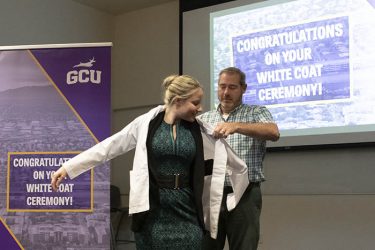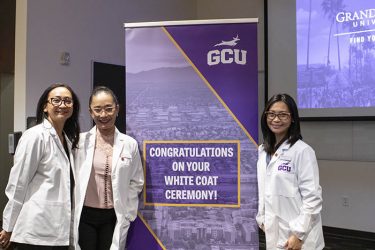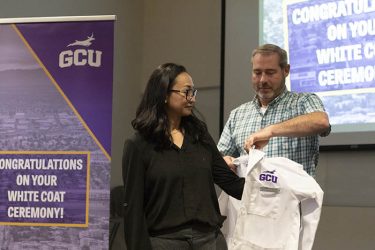
Story by Lana Sweeten-Shults
Photos by Alan Cisneros

Professors asked master’s degree students in Grand Canyon University’s Advanced Practice Registered Nurse program to choose one word that says everything for them. One word that will be with them for the rest of their graduate program — that represents life to them or that encompasses success.
Serendipity, serve, grace, perseverance, blessings, believe: Those were just a few of the words chosen by students who are enrolled in GCU’s Family Nurse Practitioner program or the Adult-Gerontology Acute Care Nurse Practitioner program.
The words show the kind of grit characteristic of nurses, said Dr. Tami Wisely, Associate Dean for Graduate Programs in the College of Nursing and Health Care Professions, who spoke at the college’s first White Coat Ceremony on Friday in the Technology Building.
She shared with students the five characteristics of grit, according to American psychologist Angela Lee Duckworth: Courage, conscience, perseverance, resilience and passion.
“Don’t lose sight of maintaining that grit as you finish strong in this program, because you WILL finish, and that (grit) is exactly what that is – to set a goal, follow through, don’t quit, learn from your mistakes, take the constructive criticism and become stronger,” Wisely said.
At Friday’s ceremony, faculty cloaked a dozen students in their white coat, symbolic of them moving on to the next phase of their health care career. Students also received the “Keeping Health Care Human” lapel pin and recited an oath.
The White Coat Ceremony, founded by the Arnold P. Gold Foundation in 1993, originally was meant to recognize students in medical school, but it since has been adopted by all health care disciplines. It branched into nursing in 2013.

“It was time for us to include this as part of our program,” Wisely said of the ceremony, a rite of passage that marks the transition of the students — all of them practicing registered nurses — from their classroom work into the clinical setting.
GCU President Brian Mueller in a recorded address expressed his pride in the nursing program and the students at the ceremony.
“We’re going to have a huge need for health care professionals moving forward at every level. The fact that these students have challenged themselves to a very rigorous academic program at a time when they’re currently working and raising families, and they’re willing to step up and do this and take a leadership role in the health care community is really, really important to the University,” he said. “… We know that they’re going to have a huge impact on this country during their work years.”
University Provost Dr. Hank Radda told students in his recorded address, “I want you to know how much I appreciate what it takes to do that kind of work — to make a difference in people’s lives and how rewarding that is — but how important it is we do that in a very thoughtful, knowledgeable and caring way,” Radda said.
Dr. Lisa Smith, Dean of the College of Nursing and Health Care Professions, spoke to students about humanism, compassionate care and human flourishing.
Nursing views the person holistically and “considers all aspects of the person toward their recovery or supports the individual’s pursuits toward a new path of human flourishing,” she said.
“Although you are transitioning from providers of nursing care to providers of medical care, at your core, you are a nurse and, therefore, will approach your new practice through a nursing lens.”
Smith also emphasized how providing holistic care doesn’t mean just providing care from a health care perspective but also from the perspective of Christian worldview.

Human flourishing originates with God, and a biblical vision for humans to flourish encompasses our whole being, body, mind and spirit, Smith said: “When we trust God’s purpose for our lives, human flourishing occurs.”
After they were cloaked in their white coats, students also took an oath.
“It’s a promise – a commitment,” Wisely told the students. “It’s one that you’re making before you walk in to take care of a patient, and it’s so important because we, as a Christian university, obviously stand on compassion ... But we want you to make that promise of commitment, compassionate care, holistic care and high quality care. That’s what your oath will be.”
Amanda Sepulveda of Tucson, Arizona, was one of the graduate students who was part of Friday’s cloaking ceremony.
She wanted to become a nurse because “it’s a career that allows me to make such a big difference in people’s lives.”
Carmencita Texon of Houston traveled to GCU with five other nurse practitioner graduate students from Texas for one of their required multiple-day, on-campus experiences as part of their online master’s degree program.
Texon has been a registered nurse since 1992 and works at a step-down unit but hopes to work with a cardiology group or other similar medical group after she receives her master’s.
“I am back to school almost 30 years after graduation,” she said, adding how the White Coat Ceremony reminds her of her capping ceremony when she first became a nurse.

Gina Mercado, also of Houston, said she was nervous at what the White Coat Ceremony meant – that she was moving on to another phase of her life. But she also was excited.
She became a nurse because she loves taking care of people, and she’ll continue to do that.
“I feel my purpose now,” she said, “and the significance of what I will bring.”
GCU senior writer Lana Sweeten-Shults can be reached at [email protected] or at 602-639-7901.
***
Related content:
GCU Today: GCU earns reaccreditation for all nursing programs
GCU Today: Students' heart for nursing earns them stethoscopes



































































